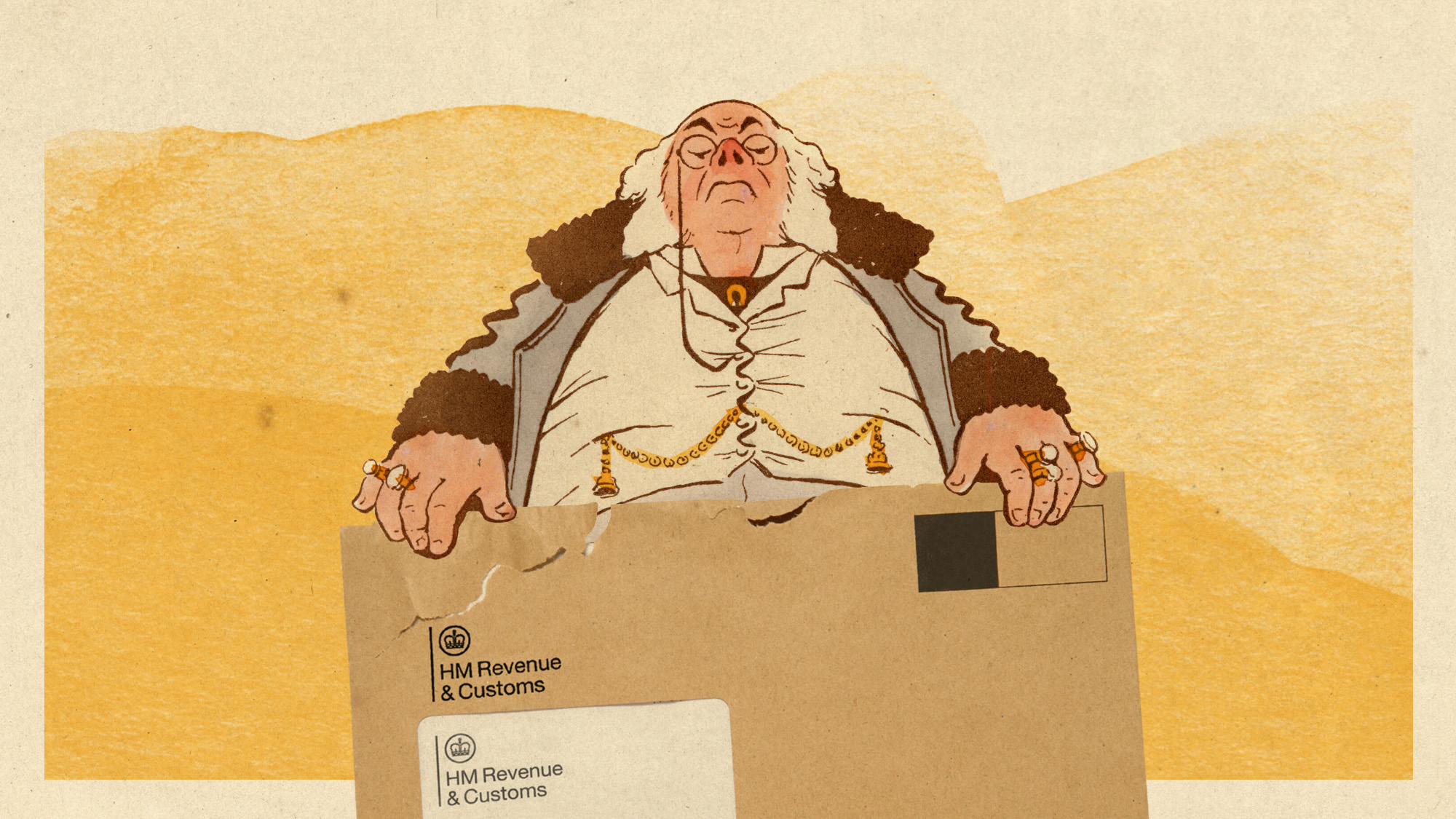Will the UK economy bounce back in 2024?
Fears of recession follow warning that the West is 'sleepwalking into economic catastrophe'

Fears the UK is heading for a recession are growing as the economy unexpectedly shrank slightly in the third quarter, with gross domestic product falling by 0.1%.
The "tepid numbers" from the Office for National Statistics (ONS) for the three months to September represent a "downward revision" from the earlier estimate of a 0.2% increase, and highlight the economy's struggle to "shake off low-growth performance", said the Financial Times.
The figures mean the UK is "at risk of recession", said the BBC. So how might the nation's economy perform in 2024?
Subscribe to The Week
Escape your echo chamber. Get the facts behind the news, plus analysis from multiple perspectives.

Sign up for The Week's Free Newsletters
From our morning news briefing to a weekly Good News Newsletter, get the best of The Week delivered directly to your inbox.
From our morning news briefing to a weekly Good News Newsletter, get the best of The Week delivered directly to your inbox.
What did the papers say?
The UK's economy is "stuck in a lacklustre state" as it wrestles with "high borrowing costs and the legacy of the worst inflationary upsurge for a generation", said the FT.
Projections released by the Bank of England in November suggested there is "little immediate prospect of a bounceback", as the central bank forecasts "near-zero growth through next year, even as the worst of the inflation subsides".
But speaking to the paper, Chancellor Jeremy Hunt insisted that 2024 was "when we need to throw off our pessimism and declinism about the UK economy".
Hunt has "sought to give Tory MPs an early Christmas present" with "another hint he could cut taxes ahead of a general election next year", said The Independent. The chancellor said the government would "cut the tax burden if we are able to".
A free daily email with the biggest news stories of the day – and the best features from TheWeek.com
He also raised the prospect of the Bank of England reducing interest rates in 2024, which is "when people will begin to have more confidence about their own personal prospects and the prospects of their family".
However, the FT said that his talk of rate cuts will "jar" with the Bank of England, which "jealously guards its independence and has been insisting it is too soon to discuss easing policy".
If employment "stays solid" then the economy "should do OK", John Stepek wrote for Bloomberg, but if unemployment "really surges (as opposed to rising a bit), then all bets are off".
Stepek also forecast that 2024 would be "sluggish for the housing market". Although Hunt "probably doesn't have much room for fireworks at his next budget", he added, it's "hard to see him resisting some sort of freebie" in the form of a tax cut.
But there could be big problems from further afield. Philip Pilkington warns in The Telegraph that the West is "sleepwalking into an economic catastrophe in the Red Sea". The Houthi rebels "could well manage to enact a de facto blockade of the Suez Canal by preventing commercial maritime vessels entry to the Red Sea", he wrote, and "the economic effects of this could be nothing short of profound".
If the Red Sea "remains a no-go zone for some time", it "looks like the Western world is going to have to brace for another wave of inflation", and "frankly, it is not clear that our economies, beaten and bruised from the last wave, can take it".
What next?
The latest ONS figures "show how close the UK could have come to a formal recession, which is marked by two consecutive quarters of negative growth", said The Times, but it will "not be clear until February" whether the UK has entered or avoided recession when figures are released for the October to December quarter.
Samuel Tombs, chief UK economist at Pantheon Macroeconomics, told The Times he expected growth to hold steady in the final three months of the year, "before then rising at an average quarter-on-quarter rate of 0.3% during 2024".
However, one of the world's biggest active bond fund managers has "dampened the festive mood" by warning of a serious economic downturn next year, said The Guardian.
Daniel Ivascyn, chief investment officer at Pimco, compared the UK economy with the US, and said that "in the case of the UK – a smaller, open economy, with a consumer that's feeling the brunt of central bank policy far more than their US counterparts – you just have a higher probability of more significant economic deterioration".
He added that "there's potentially more hard landing risks", a term that refers to a marked economic slowdown or downturn following a period of rapid growth.
Chas Newkey-Burden has been part of The Week Digital team for more than a decade and a journalist for 25 years, starting out on the irreverent football weekly 90 Minutes, before moving to lifestyle magazines Loaded and Attitude. He was a columnist for The Big Issue and landed a world exclusive with David Beckham that became the weekly magazine’s bestselling issue. He now writes regularly for The Guardian, The Telegraph, The Independent, Metro, FourFourTwo and the i new site. He is also the author of a number of non-fiction books.
-
 Savages: a tragi-comedy set in a 'quirky handcrafted world'
Savages: a tragi-comedy set in a 'quirky handcrafted world'The Week Recommends This new animated film by Oscar-nominated filmmaker Claude Barras is undeniably political, but it has a hopeful message
-
 Why 'faceless bots' are interviewing job hunters
Why 'faceless bots' are interviewing job huntersIn The Spotlight Artificial intelligence is taking over a crucial part of recruitment
-
 Who will win the battle for the soul of the Green Party?
Who will win the battle for the soul of the Green Party?An ideological divide is taking root among the environmentalists
-
 Why 'faceless bots' are interviewing job hunters
Why 'faceless bots' are interviewing job huntersIn The Spotlight Artificial intelligence is taking over a crucial part of recruitment
-
 How is Trump's economy doing?
How is Trump's economy doing?Talking Points The latest jobs numbers suggest a slowdown in the offing
-
 Samsung to make Tesla chips in $16.5B deal
Samsung to make Tesla chips in $16.5B dealSpeed Read Tesla has signed a deal to get its next-generation chips from Samsung
-
 Why has the Russian ruble performed so well this year?
Why has the Russian ruble performed so well this year?Today's Big Question Despite economic malaise, Russia's currency is up 45% on the year
-
 A potential railway megamerger raises monopoly questions
A potential railway megamerger raises monopoly questionsThe Explainer Union Pacific and Norfolk Southern would create the country's largest railway operator
-
 Can the US economy survive Trump's copper tariffs?
Can the US economy survive Trump's copper tariffs?Today's Big Question The price hike 'could upend' the costs of cars, houses and appliances
-
 AMC hopes new ticket discounts will reinvigorate the movie theater industry
AMC hopes new ticket discounts will reinvigorate the movie theater industryIn the Spotlight The theater chain now has 50% discounts on both Tuesdays and Wednesdays
-
 Pros and cons of a wealth tax
Pros and cons of a wealth taxPros and Cons Raising revenue and tackling inequality vs. the risk of capital flight and reduced competitiveness